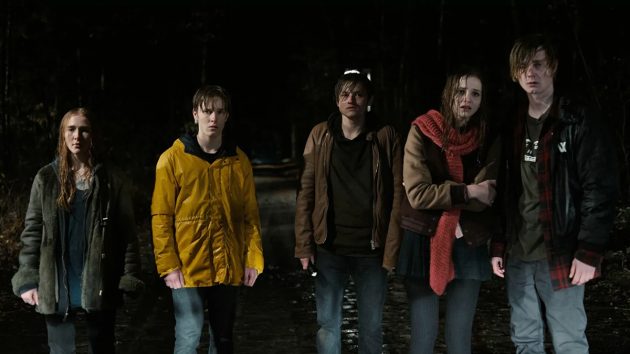Secrets, lies, dark matter, Chernobyl, twisted family trees, child abduction, murder, betrayal and the end of the world: Netflix’s Dark has it all. As they used to say in the intro to Soap, “Confused? You will be”. I’m just two episodes from the series end and I’m still very, very confused.
And I love it.
“Dark” is Netflix’s first big success in foreign-language drama. The German drama series began in 2017 and wrapped up earlier this year. Think of it as a unique blend of Twin Peaks and Stranger Things. Like David Lynch’s iconic show (especially its long-delayed final season in 2017), Dark isn’t afraid to meander through a Byzantine plot while teasing out the resolution of its initiating device, a baffling series of child disappearances in a small German town. Unlike Stranger Things (particularly its second season), Dark doesn’t rely almost wholly on 80s nostalgia.
The story begins in 2019, as teenager Jonas Kahnwald returns to the small German town of Winden from two months at a psychiatric facility following the suicide of his father, Michael. Winden is grappling with the disappearance of a local teenager. Then police officer Ulrich Nielsen’s son, Mikkel, also disappears, in circumstances linked to mysterious goings-on in the caves that run beneath the town’s major employer, the local nuclear power plant. Then, the body of another, unidentified boy appears.
As Jonas and Ulrich separately begin unravelling the mystery of what is happening in Winden, a labyrinthine web of secrets and lies is slowly laid bare. Ulrich’s brother, Mads, also disappeared, in 1986. Ulrich is also having an affair with Jonas’ mother, Hannah, who has had a crush on Ulrich since high school in the 1980s.
That’s just the start of the tangled skein that is the plot of Dark.
Although the story begins in 2019, the plot expands to include story-lines from 1986 and 1953, as core characters each begin to discover that time travel is an inextricable link in their stories. Slowly, four generations of the four core families of the series, the Kahnwalds, Nielsens, Dopplers and Tiedemanns, and their fractured relationships, double lives, and dark past are revealed.
At the core of Dark is history, secrets and lies. The heavy hand of the past is everywhere in Dark, without wallowing in nostalgia or stating the obvious. Chernobyl is explicitly referenced, mostly in background news reports and offhand comments in the 1986 timeline, while the ghosts of the two World Wars are unspoken, looming shadows. Germany’s WWII history is never explicitly referenced, but its tacit presence is hinted at in a monologue from Ulrich’s wife, former school bully turned headmistress, Katharina, who tells a talkback host that no-one in the town ever says so, but everyone knows that murderers lurk among them.
Like Twin Peaks, what matters most in Dark is not so much finding ultimate resolution as the journey itself. As I say, I’m two episodes from the end, but I’ve still no idea how it will end. Also like Twin Peaks 90s run, Dark was supposedly brought to a finale earlier than the makers would have liked (apparently they wanted, and were denied, a fourth season), but fans say that the conclusion is nonetheless satisfying. I’m willing to take their word for it.
Because, also like Twin Peaks, Dark is beautifully made. The story constantly references time-travel paradoxes (the “grandfather paradox”, the “bootstrap paradox”, and so on), as well as the Bible, literature (Goethe, Dante) and Classical mythology (Ariadne, Theseus and the Minotaur). Other subtle touches includes its colour palette: almost uniformly washed-out grey-blue, except for the repeated motifs of saturated red, yellow and teal splashes, which refer its recurring theme of threes.
The series’ makers have also paid admirable care to the casting. The likeness between child and adult versions of many characters, such as Ulrich, Jonas, Magnus or Aleksander, is often startling. As the show unfolds, the writers reveal key details from the past which often turn the viewer’s perception of characters on their heads.
All in all, Dark is compelling viewing.
Just two warnings:
First: Subs before dubs. The Netflix version defaults to an English dub. Switch it to the German original with English subs.
Second: Whatever you do, do not look up characters on the internet. Yes, it’s often confusing who is who in different timelines, but, as I found out, looking up character bios on the internet is a certain road to major spoilers.
Dark is currently streaming on Netflix.

If you enjoyed this BFD article please consider sharing it with your friends.

